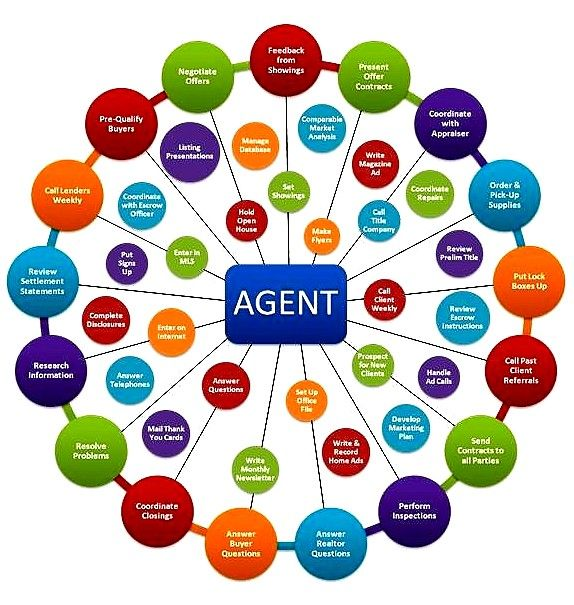Recognizing the Trick Differences Between a Realtor and Realty Professionals for a Successful Property Deal
Browsing the intricacies of actual estate transactions necessitates an understanding of the unique functions played by Realtors and property representatives. Although both are certified experts, the subtleties in their credentials and ethical obligations can considerably affect the end result of your property transactions. Realtors, bound by the rigorous code of values of the National Organization of Realtors, guarantee a degree of stability that may not be guaranteed with all real estate agents. With the potential to influence openness and arrangement effectiveness, selecting the best professional becomes a crucial choice. However what other elements should be thought about for a seamless transaction?
Defining Real Estate Professionals and Representatives


In the actual estate market, distinguishing between a Real estate professional and a genuine estate representative is important for understanding their distinctive functions and qualifications. A genuine estate agent is a specialist who has actually acquired a license to help buyers and vendors in real estate purchases.
On the other hand, a Real estate agent is a qualified actual estate representative who is also a member of the National Association of Realtors (NAR) While all Real estate agents are genuine estate representatives, not all genuine estate representatives are Realtors, making this difference necessary for customers looking for a specialist with a dedication to moral techniques.
Licensing and Qualifications
Getting a realty permit is the fundamental action for individuals desiring come to be either a realty representative or a Real estate professional. Elizabeth Leanza Synergy Realty Realtor. This process typically entails completing a set variety of pre-licensing educational hours, passing a state-administered test, and satisfying any added state-specific demands. The instructional curriculum normally covers vital topics such as property principles, home regulations, contracts, and money, furnishing prospects with detailed sector understanding
While all Real estate professionals are real estate agents, not all genuine estate representatives are Realtors. To become a Real estate professional, a qualified real estate agent have to join the National Association of Realtors (NAR), which needs adherence to a rigorous collection of criteria and conclusion of further education.
Ethical Criteria and Codes
Promoting ethical criteria is a cornerstone of professional practice in the real estate industry. These standards differentiate a Realtor from a basic realty representative, affecting exactly how they carry out service. Realtors, members of the National Organization of Realtors (NAR), stick to a stringent Code of Ethics, developed in 1913, which mandates sincerity, honesty, and professionalism and trust. This code includes 17 check my reference write-ups concentrating on duties to clients, the public, and various other Realtors, covering problems like customer discretion, sincere marketing, and reasonable treatment.
On the other hand, real estate representatives have to adhere to state licensing regulations, which give a standard of moral habits yet might not be as detailed or strict as the NAR's Code of Ethics. While representatives are obligated to operate lawfully and fairly, the absence of a widely applied ethical code can bring about variability in practice criteria.
For customers, recognizing these distinctions is vital - Elizabeth Leanza Synergy Realty Realtor. A Realtor's dedication to a greater moral criterion can offer additional guarantee of professionalism and trust and responsibility. When selecting between a Realtor and a realty representative, recognizing the relevance of ethical codes can direct customers toward an expert that aligns with their expectations for moral conduct in residential property transactions

Effect on Transactions
Recognizing the moral requirements that Realtors follow gives a foundation for analyzing their effect on realty deals. Realtors, as participants of the National Association of Realtors (NAR), are bound by a strict Code of Ethics, which dramatically influences their communications and settlements in property purchases. This adherence to honest practices makes certain openness and integrity, cultivating count on in between all celebrations entailed. Such trust fund is important for a successful transaction, as it can improve interaction and help with smoother settlements.
The Real estate professional's commitment to moral criteria converts into a much more expert and reliable service, commonly causing quicker and extra look at this website reliable transactions. Their obligation to act in the most effective rate of interests of their customers can cause far better end results, such as safeguarding favorable terms or identifying prospective issues early at the same time. Furthermore, Real estate agents are furnished with detailed market understanding and resources, enhancing their ability to navigate complex transactions adeptly.
In contrast, real estate agents who are not Realtors may not be bound by the exact same strict honest guidelines. This difference can impact the transaction process, possibly presenting irregularity in solution top quality and customer complete satisfaction levels. Elizabeth Leanza Synergy Realty Realtor. Ultimately, the impact of a Realtor's ethical dedication can be considerable, promoting positive experiences and effective home purchases
Choosing the Right Professional
Picking the appropriate actual estate professional is an essential step in making sure a successful home purchase. The selection between a Real estate agent and an actual estate representative hinges on several aspects, consisting of the details needs of the deal and the level of expertise required.
On the various other hand, actual estate representatives who are not Realtors can still provide high degrees of solution and proficiency. Their skills and experience must be evaluated based Extra resources upon their performance history, neighborhood market expertise, and customer reviews. When selecting in between these professionals, consider their experience with the kind of home involved and their settlement skills, which are critical for accomplishing desirable terms.
Eventually, the decision ought to be informed by detailed research and individual meetings to evaluate compatibility and communication style. This ensures that the chosen specialist aligns with the customer's goals and expectations, paving the means for a smooth residential or commercial property transaction.

Final Thought
In recap, distinguishing in between Realtors and real estate representatives is important for browsing property purchases effectively. Choosing a Real estate agent can substantially boost the total experience and confidence in the acquiring or marketing procedure, ultimately contributing to more successful residential or commercial property transactions.